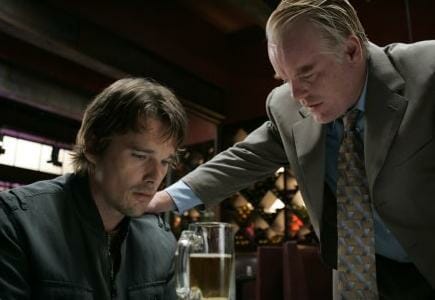
DVD Release Date: April 15
Original Theatrical Release Date: Oct. 26, 2007
Director: Sidney Lumet
Writer: Kelly Masterson
Starring: Philip Seymour Hoffman, Ethan Hawke, Albert Finney
Studio/Run Time: THiNKFilm, 117 mins.
Truly a Modern Classic
Sidney Lumet’s breakthrough film came out in 1957, the remarkable, character-driven drama 12 Angry Men. While only a decade before the auteurs would take over Hollywood and remake its landscape, this feature was an age apart in the world of filmmaking. Since then, Lumet has been working steadily, producing both successes and failures, but unlike those who came after him, he remains a director from classical Hollywood, focused on performances and story instead of stylization. His best works today look largely the same as they did 30 years ago, only with digital video replacing film and Phillip Seymour Hoffman replacing Al Pacino.
Not that this is meant as any large knock against Lumet, whose engaging Before the Devil Knows He’s Dead illustrates why this old formula was so successful in the first place. In the center of the film lies Andy Hanson (Phillip Seymour Hoffman), convincing his younger brother Hank (Ethan Hawke) to stage a heist on their parents’ jewelry store. The plan goes terribly askew, resulting in their mother’s death. This is no spoiler, as the actual event takes place in the very beginning of the film and is almost a foregone conclusion before the heist begins; there is no suspense that this plan will go awry. What makes the feature interesting is the way it explores its characters’ motivations and reactions to the event, eventually resulting in the dissolution of an entire family.
Giving its characters space to be understood by the audience is the film’s strength, and Lumet knows just what he’s doing in eliciting three extremely strong performances from Hoffman, Hawk and Albert Finny, who plays the Hanson family patriarch. Each of the three men is a complex individual, attacked with multiple motivations and unsure of where they stand on the whole catastrophe. As the film plays out it’s revealed that Andy’s wife (Marisa Tomei) is sleeping with Hank while Hank is failing to pay child support, with their father standing aggressively over his sons and failing to understand why his family is falling to pieces in the heist’s aftermath. The storyline is given space to develop and the film does its best to give an objective perspective on everyone while the events play out.
Where the movie falters is when it tries to become a stylized gangster film, the type of thing that would’ve come from a Quentin Tarantino clone in the ’90s. This occurs in the film’s unnecessary timeline distortion, where it begins with the heist and goes backwards and forwards from the event to tell individual stories. This sort of mucking around with time does work in some features, but ultimately there’s no big payoff or revelation in Devil, leaving almost more of a mystery why it’s in the film to begin with. Instead, structuring the feature in this way draws attention to itself, which conflicts with the way the rest of the film’s emphasis is on its characters’ internal struggles.
Even with these structural issues, the film’s completely conventional mode of narration is so strong that it overpowers its slight quirks. Devil really is a feature from the old school, and long takes with actors able to speak actual dialogue rather than mere catch-phrases is what makes it such an affecting picture. In other hands, Devil could quickly become no more than another meditation on slick violence and drug-fueled crime, but Lumet’s interest in looking deeper than this to find where the motivation for crime and drugs comes from is what makes it a stirring film.
Fifty years ago, a film like this might not have been such an anomaly, as not every release was either a studio-driven blockbuster or an auteur-driven arthouse film. Today, though, this somber reflection on crime is as much a breath of fresh air as any premier feature at a film festival. By driving home the values of classical filmmaking, Before the Devil Knows You’re Dead acts as a reminder of why this type of film remains valuable, and why an 86-year-old director is still as important to the world of cinema today as he was 50 years ago.